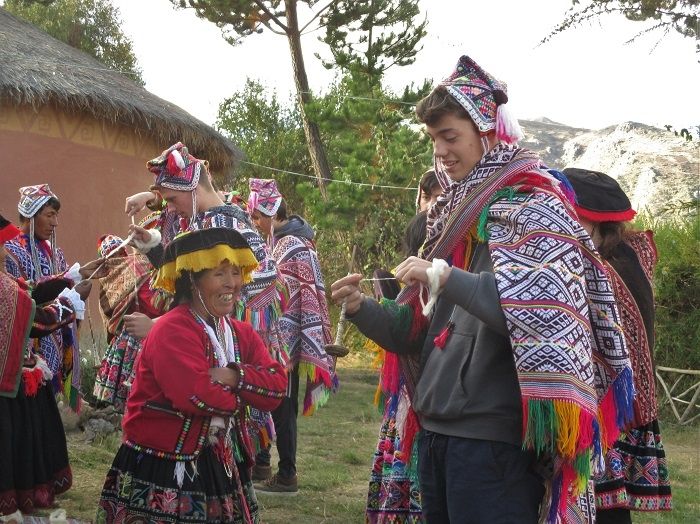Visit to the Amaru Community
If you scroll through the photos or view some of the videos in this post, you will notice lots of color, smiles, laughter, and togetherness. However, no photos can do justice to the overwhelming joy and sense of community with which we were welcomed for our afternoon visting Amaru.
The Amaru are one of several small communities surrounding Pisac but are known for their dedication to preserving traditional techniques to produce textiles. From the sheering of the wool, to the making and dying of thread, to the weaving of the finished product, these people employ the techniques that their ancestors have been using for centuries. Students got to experience firsthand the time and dedication that goes into authentic products that we have been seeing for sale in the many markets we have visited during our time in Peru.
Our visit started with a ceremonial entrance. Upon passing through a natural arch, we were showered with flower petals, adorned with a necklace made of cantu, the national flower of Peru, and given a warm hug by the community members assembled to greet us.

Then, it was time to get dressed! The Amaru dressed us in traditional clothing worn during their carnival period (usually in February and March). The brightly colored garments symbolize joyful festivity, which they chose because of their joy in having us visit.



Once we looked the part of Amaru people, it was time to for some learning. We listened to a bilingual presentation in quechua (the indigenous language widely spoken throughout Peru) and Spanish about the process of sheering, washing the wool, and the different plants and processes used to produce a variety of colors.
Once we had some background knowledge, it was manos a la obra. Students got to work…
Making thread from wool with a traditional pushka


Winding thread into balls to be used for weaving


Weaving the old-fashioned way


The work was a lot harder than we anticipated, and we worked up quite an appetite. Fortunately, the Amaru community was ready with a snack of hot potatoes (fun fact: there are over 3,000 varieties of potato in Peru) with ají (a local sauce made with chilis) and muña tea.


After our snack, we were ready to bailar! Accompanied by traditional music, we learned a few dances used by the Amaru for celebrations.
The first dance was almost more like a twist on a game of tag. The women use a huactana, a long, colorful cord, and try to tap men above the knee. Bonus points if you can lasso a leg!
The second dance also employs the colorful cords, with partners grabbing each end and twirling in a circle.
[VIDEO::https://youtu.be/tdNMLIr_l_s]
Judging by the abundant smiles and pervasive alegría, this was everyone’s favorite part of our visit.
Sulpayki, gracias, and thank you to the Amaru community for the warm welcome and wonderful memories!

Related Posts
¡Adios, Pisac!
It's hard to believe, but our month in Pisac has come to an end. Although in many ways it has flown by, we have experienced and learned so much that... keep reading
Getting to Know Huchuy Cusco
Our last weekend in Peru had to be something special, and our visit to Huchuy Qosqo ( quechua for “little Cusco”) was just that. This close-knit community about half an... keep reading
Machu Picchu, Ollantayambo, Chinchero
This past weekend we got to see one of the 7 wonders of the world - Machu Picchu! The weekend was spent between hiking, learning about the history and legacies... keep reading














